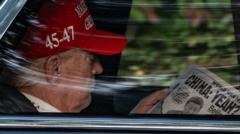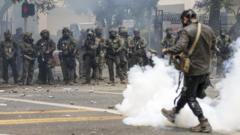The U.S. grapples with significant economic consequences following the introduction of tariffs, affecting global markets and inciting widespread protests.
**Trump Calls for Resilience Amid Imposition of Tariffs on Imports**

**Trump Calls for Resilience Amid Imposition of Tariffs on Imports**
As a new 10% tariff takes effect, Trump encourages patience from Americans amidst market chaos.
The United States has officially implemented a 10% "baseline" tariff on all imports, with President Donald Trump urging the American public to "hang tough" during these turbulent economic times. The initiation of these tariffs has affected hundreds of countries, including the UK and France, which have responded with strong rhetoric, indicating that "nothing is off the table" in considering their response.
Market reactions were severe, as all three major U.S. stock indexes experienced sharp declines, with the S&P 500 witnessing a nearly 6% drop. This marked the worst week for the U.S. stock market since 2020. In various cities including Washington D.C. and New York, thousands have taken to the streets in protest against a broad range of Trump's policies, raising concerns over economic management and government funding.
In a post shared on Truth Social, Trump characterized the market turmoil as an "economic revolution" that the U.S. will eventually prevail in. He urged Americans to endure through the difficulties, claiming that the eventual outcome would be "historic." The economic fallout from his tariff policies continues to ripple through global supply chains, as illustrated by the 5% decline in the UK's FTSE 100, the steepest plunge it has seen in five years.
Billionaire entrepreneur Elon Musk, a key supporter of Trump, suggested a potential shift towards "zero-tariff situations," which could forge a significant free-trade alliance between Europe and North America. His remarks coincided with plans by the Trump administration to impose hefty tariffs exceeding 50% on certain goods targeted at countries deemed to be exploiting trade imbalances.
British Prime Minister Sir Keir Starmer has been actively engaging with world leaders in response to the turbocharged trade standoff. Following discussions with French President Emmanuel Macron, both leaders expressed their concerns regarding the implications of a trade war, particularly its effects on the global economic landscape and security in regions like South East Asia.
China, heavily impacted by Trump's policies, retaliated by announcing a 34% tariff on U.S. imports, mirroring the recent U.S. tariffs against it, and also lodged a complaint with the World Trade Organization. Chinese officials have called on the U.S. to cease the use of tariffs as a tool for economic suppression.
In the U.S., an estimated 1,200 protests were anticipated to unfold, marking one of the largest collective demonstrations against Trump and Musk's policies since significant changes to government structure were announced. Amidst the protests, with notable media attention on Trump's handling of current events, the administration remains silent on the unrest. Additionally, Jaguar Land Rover in the UK has announced a temporary halt on shipments to the U.S., signaling the real-world impact of the new trading conditions.
Market reactions were severe, as all three major U.S. stock indexes experienced sharp declines, with the S&P 500 witnessing a nearly 6% drop. This marked the worst week for the U.S. stock market since 2020. In various cities including Washington D.C. and New York, thousands have taken to the streets in protest against a broad range of Trump's policies, raising concerns over economic management and government funding.
In a post shared on Truth Social, Trump characterized the market turmoil as an "economic revolution" that the U.S. will eventually prevail in. He urged Americans to endure through the difficulties, claiming that the eventual outcome would be "historic." The economic fallout from his tariff policies continues to ripple through global supply chains, as illustrated by the 5% decline in the UK's FTSE 100, the steepest plunge it has seen in five years.
Billionaire entrepreneur Elon Musk, a key supporter of Trump, suggested a potential shift towards "zero-tariff situations," which could forge a significant free-trade alliance between Europe and North America. His remarks coincided with plans by the Trump administration to impose hefty tariffs exceeding 50% on certain goods targeted at countries deemed to be exploiting trade imbalances.
British Prime Minister Sir Keir Starmer has been actively engaging with world leaders in response to the turbocharged trade standoff. Following discussions with French President Emmanuel Macron, both leaders expressed their concerns regarding the implications of a trade war, particularly its effects on the global economic landscape and security in regions like South East Asia.
China, heavily impacted by Trump's policies, retaliated by announcing a 34% tariff on U.S. imports, mirroring the recent U.S. tariffs against it, and also lodged a complaint with the World Trade Organization. Chinese officials have called on the U.S. to cease the use of tariffs as a tool for economic suppression.
In the U.S., an estimated 1,200 protests were anticipated to unfold, marking one of the largest collective demonstrations against Trump and Musk's policies since significant changes to government structure were announced. Amidst the protests, with notable media attention on Trump's handling of current events, the administration remains silent on the unrest. Additionally, Jaguar Land Rover in the UK has announced a temporary halt on shipments to the U.S., signaling the real-world impact of the new trading conditions.





















